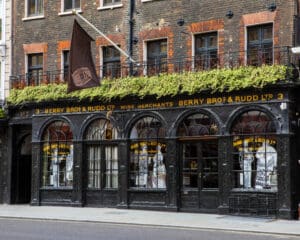
The Berry and Rudd families, owners of the esteemed London wine merchant Berry Bros & Rudd, have raised concerns over recent inheritance tax reforms that could threaten the future of their 376-year-old business.
The Labour government’s proposed 50% reduction in business property relief—which allows family-owned businesses to pass down assets tax-free—has left the families grappling with the prospect of significant new costs.
Emma Fox, CEO of Berry Bros & Rudd, described the policy change as a “body blow” to the family-run institution. The company’s property holdings, valued at around £90 million, include its historic headquarters on Pall Mall, a vast fine wine storage facility in Kent, and a 50% share in the Hambledon Vineyard in Hampshire.
Emily Rae, CFO of the business, highlighted the importance of the relief, saying, “It’s something the families have relied upon to keep the business within the family.” The shift has prompted the families to reconsider their long-term investment strategies, with potential changes to their balance sheet and future asset allocation.
Fox, a former executive at Asda and Bass, warned that the inheritance tax changes might hinder the company’s ability to make long-term investments, impacting its “patient capital” approach focused on generational growth rather than short-term returns. “This budget forces us to operate differently,” she added.
Berry Bros & Rudd’s concerns mirror those of other UK family businesses, with industry figures like Sir James Dyson denouncing the policy as a “family death tax” that could stymie both established businesses and aspiring entrepreneurs.
The warnings from Berry Bros & Rudd coincide with the release of its financial results for the year ending in March. The company reported a 50% drop in earnings before interest, taxes, depreciation, and amortisation (EBITDA), down to £10.1 million, and a pre-tax loss of £2.2 million. These declines reflect a challenging market landscape and substantial investments, including a £27 million commitment to expand its operations.
The investments included a joint venture with port house Symington to acquire Hambledon Vineyard and a stake in the Cotswolds Distillery. However, the business has faced headwinds in its US operations. Hotaling, its San Francisco-based spirits importer, which contributes about 30% of the company’s revenue, experienced a significant downturn as post-pandemic spirit sales dropped across the US market.
Despite these challenges, Fox noted improvements in Hotaling’s performance over the past six months and expressed confidence in outpacing competitors as the US market rebounds.
The wine merchant’s core business of fine wine retail and storage remains robust, with single-digit growth in retail and a 25% increase in storage revenues, driven by collectors paying premiums for temperature-controlled wine storage. Berry Bros & Rudd recently completed its first fine wine auction as part of an effort to diversify its offerings, while its events and entertainment division grew by 16%.
Lizzy Rudd, chair of Berry Bros & Rudd, underscored the board’s commitment to the business’s sustainability, approving a dividend of £13.10 per share—up from 794p last year—reflecting the “sustainable underlying growth in the business” despite challenging conditions.
Read more:
Berry Bros & Rudd families warn inheritance tax changes threaten legacy of historic wine business







